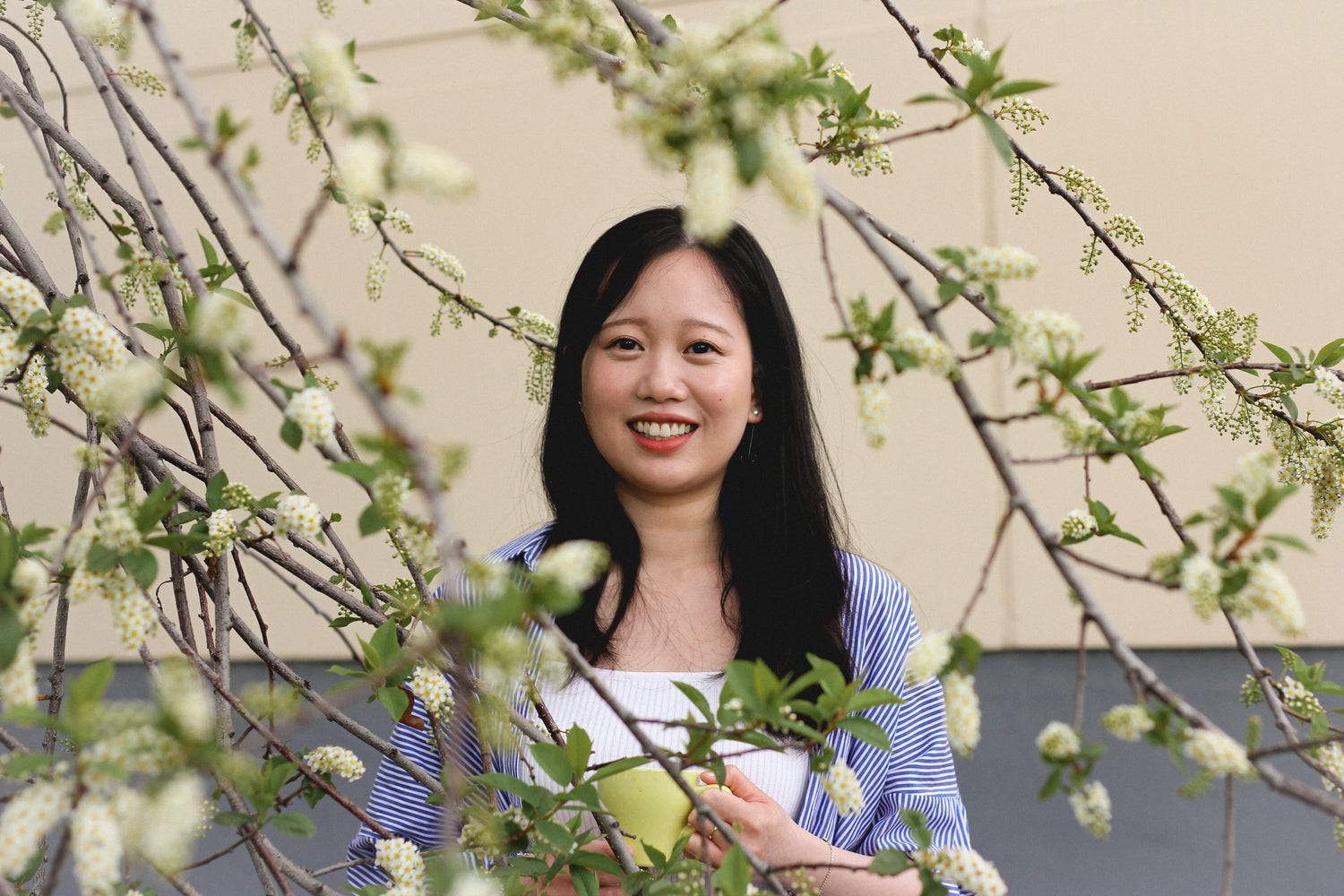What Really Matters to Jenny Tan

Who or what inspired you to go into coffee?
When I first went into coffee it was because I needed a part-time job. I think there's this romanticism around becoming a barista, and like, that fantasy of working at the bar. And I think a lot of people have that kind of idea when they initially look at working in the coffee industry. It was after Grade 10 I applied to my first job, and that was at Café Blanca, but as you know that café is not open anymore, unfortunately. That was what initially got me to work in the coffee industry.
But in terms of who actually inspired me to stay, I would have to say it's definitely Jeff [Fleming] from Apex, my boss. It's only recently I decided to take this seriously because before I was in nursing for a couple of years at MRU. And then I took a couple years off to think about my long-term goals and what I really want to do for my career. During that break, I was working for Jeff and Coffee Concept. I was working full-time while doing part-time school, so that I could go into finance instead. At first I wanted to pursue a lucrative job like everyone else. Money is kind of like the driving force for most people. I had to sit down last year to really think about this and if my values aligned with that type of career. But I think watching Jeff build his own company and how much of a great leader he is made me want to stay in this career. All of the people I've met are so inspiring and this industry has so many people willing to help you rather than compete with you and steal your spot. Everyone's kind of moving forward together and that's what I really like about this industry and why I want to stay.

Do you think putting up your own business can still be intertwined with your goals in coffee?
I definitely think it can be intertwined. There's so many more ways you can earn money, earn a comfortable living. My reason now for pursuing finance is to understand how to manage my money well so that I can achieve my dream of having a coffee career. I think that's so important because if I just jump ship without any knowledge of how to sustain myself, then I wouldn't be able to pursue my dream. In that sense it supplements my goal. That's why I'm in business. I didn't go into business because I had a strict goal of becoming a CFA or accountant. It was more so I could learn that knowledge and apply it somehow in my future career. That's why I started Paradigm Spark with David [Kim] and I think I can apply all those skills I learned in business to Paradigm Spark and Apex.
Can you tell us more about Paradigm Spark?
It all started with the thought "what can we change in the industry and are we in a place where we can actually do something to improve the industry?" Through Paradigm Spark, what we're aiming is to shift the paradigm of what we think a coffee career is. For example, we believe that baristas are very valuable and people in the coffee industry are very valuable. We want to show this by creating a new payment structure that benefits baristas and encourages them to express their talents in new ways. I know there's a lot of focus on farmers at the beginning of the supply chain. I think we also have to focus on every aspect of the supply chain, especially baristas, because that's where we can express the talents of the farmers in front of the customer.

Earlier you brought up choosing a career that aligned with your values. What are some of the values that you had to consider?
I think a lot of people chase worldly success, whether it be money, reputation, or power. For me, I kind of changed that mindset to think, "am I fulfilled with what I'm doing everyday?" At the end of the day you're not going to truly feel happy unless you're pursuing something that's meaningful to you. Some of the things I think about when I consider if I'm going on the right path is like, how are my relationships with people? Are the people that I work with, are those relationships good? Am I contributing to sustainable relationships around me? Another thing I think about is when I go to work everyday, does it feel like work or does it feel like a hobby? Just to check to see if I actually enjoy what I'm doing. Lastly I think, is the work that I'm currently doing meaningful to me? For example, is coffee tasting just another task or is it something I actually care about?
You're a working student. You work for Apex Coffee, a green coffee importer. You put up a coffee club at your university. And your most recent project is Paradigm Spark with David Kim. You were also a barista! How does one get to where you are? What does it take to be a successful coffee professional?
I think having a mindset of learning is very important and also to take as many opportunities as you can. I have so many random experiences and that's because I never really said no to an opportunity. Having an open mindset and being willing to make mistakes and fail many times, I think, is very valuable in your long-term career. Especially with The Coffee Society, I didn't want to start off with a bunch of people who were experts about coffee or had experience. When we first started, it was just a small group of friends and they had no coffee experience whatsoever. It was kind of fun that way because I think students were more willing to talk to us when they found out that we were all learning together. I think that's what's important to learning is knowing that everyone's on the same path, and you can't inflate your ego just because you know more than another person.
What advice would you give to someone who is interested in pursuing a career in coffee? Where should they start?
Being exposed to the industry as much as possible. Getting a part-time job as a barista is helpful. I think it comes with genuine interest and a genuine willingness to learn. Talk to as many people in the industry and show your interest as much as possible. I think just showing your motivation and showing that this is something you really want to do, people will come and offer you opportunities. That's how I started with Jeff. I had a really good relationship with my boss at Café Blanca and I think she saw that I was really passionate about this and that I wanted to do more in coffee. So she recommended me to Jeff. I think when people see that spark of passion in you, people recognize that and take you in, and they'll help you along the way. So get yourself out there and take as many opportunities as possible, and show that you're passionate about a coffee career and you'll do fine. (laughs)

Because it is Asian Heritage Month, we wanted to be able to share some of the traditions and customs that are unique to your heritage that other people might not know about. What's one of your favourite traditions?
One of my favourites is the Mid-Autumn festival, I think a lot of Asians celebrate it. In Chinese culture we like to eat something called mooncakes. It's so high in calories, I think one mooncake is like a thousand-something calories. I would always look forward to that every single year. Since I was born and grew up in Calgary, I'm not too connected with the traditional heritage in China because of the environment I grew up in. All I remember is eating a lot of mooncakes and my mom would buy so many and she would put it in the fridge so it would last like a couple more months. 'Cause they only sell it for like a month and then they don't have it anymore. But my mom would literally stock up and put it in the fridge and I would have so much to eat. (laughs) This is really random but every time this festival happens I remember playing this game called MapleStory. It's like this multiplayer game, it's an online game, and growing up, all I remember is, like, eating mooncake and playing this game called MapleStory and fighting monsters to protect moon bunnies. But yeah, the festival is really fun and we would always have family gatherings, and we would eat a lot of food and have mooncake after and be so full. And those are good memories.





